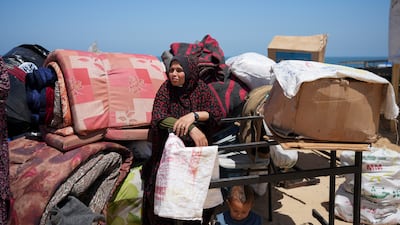One of the more tragic states of human existence is being forced to leave home with neither provision nor guarantee of ever returning – or knowing if that home will still be standing if there ever is a return.
With each passing year, and with several conflicts and disasters continuing to destroy millions of homes around the world, the number of people forcibly displaced is higher than it has ever been.
At the end of last year, it was about 76 million people across 116 countries, a record figure fuelled by war in sub-Saharan Africa and the Middle East, a report by the Geneva-based Internal Displacement Monitoring Centre found.
As reported in The National, Sudan has six million people, the second-highest number of internally displaced people in one country. The Russian invasion forced 16.9 million people from their homes in Ukraine, and 7.2 million Syrians have been displaced by 13 years of civil war. Some are displaced in their own countries, while others become refugees in neighbouring or third countries.
Gaza, meanwhile, had close to one fifth of all conflict displacements last year after Israel began its war against Hamas, with most of the territory’s population of more than 2.3 million people forcibly displaced since fighting began on October 7.
Just this month, with 800,000 people having been forced to flee Rafah since Israel began military operations, calling the forced displacement of Palestinians anything other than what it is minimises the scale of the catastrophe. The Israeli authorities would have the world believe its preferred term – “evacuation” – but this is simply an attempt to camouflage a disaster of its own making.
When bombs are being dropped on civilian populations, every family's survival instinct is to find safety, and forced displacement becomes the label on their situation. All too often, people who are forced from their homes also become invisible and merge into a data set of IDP – internally displaced people within their country.
These are profound failures of conflict prevention and peacemaking at an international level. An already dire situation is worsened by a significant lack of funds: although worldwide forced displacement is at a record high, UNHCR, the UN Refugee Agency, last year received funding to cover just 32 per cent of its global budget. The International Organisation for Migration in its first ever Global Annual Appeal this year called for $7.9 billion, including for solutions for displacement crises.
Several aid organisations are right in calling for non-specified funding. This comes free of conditions spelling out the exact aid for which they must be used. Not tying aid exclusively to, say, medicine or food or clean water allows relief organisations to be flexible in their response to the crisis. In Sudan, for example, the UNHCR was able to use non-specified funding to provide materials that secure tents against strong winds.
In Sudan, for example, UNHCR was able to make use of un-earmarked funding to provide materials that secure tents against strong winds. In Yemen, cooking utensils, soap and cash assistance were made available to displaced people, and Ethiopian families have been helped via such funding to receive blankets, sleeping mats and solar lanterns. It is important for donors to see this type of flexible funding as vital and effective to humanitarian work.
It goes without saying that transparency and accountability are prerequisites for aid organisations to receive un-earmarked donations. But there is little argument that they go a long way in helping people survive and affording them a modicum of dignity even as they remain without a home.
As is often the case, underfunding hits the poorer and lower-middle income countries hardest. And these are countries that host 90 per cent of forcibly displaced and stateless people worldwide.
The international community's foremost priority should continue to be to find diplomatic solutions to end conflicts. But it shouldn't lose sight of the pressing need to support humanitarian operations around the world. It remains imperative that stakeholders, international organisations and governments do all that they can to support the millions of families who struggle every day in the unenviable circumstance of forced displacement.


